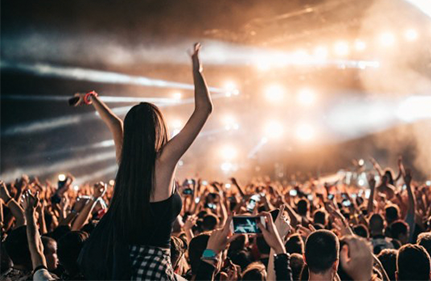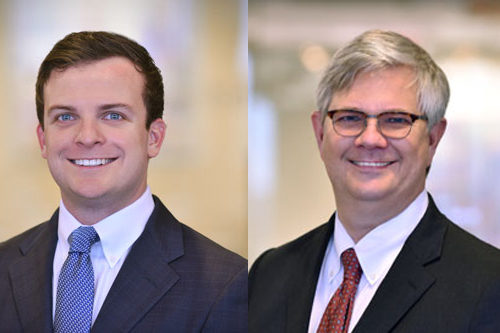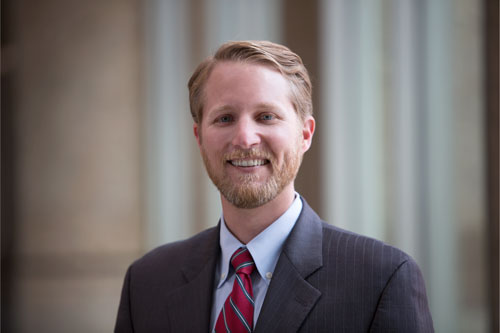THE CORONAVIRUS PANDEMIC MEANS THE NORMAL CONCERT EXPERIENCE MAY NOT BE POSSIBLE ANYTIME SOON.
The coronavirus pandemic has put a pause on concerts. At the end of March, most artists had announced that they were postponing or canceling their shows for the upcoming months. Even Coachella, one of the biggest music festivals held ever year in April, rescheduled the festival for October. However, with many artists continuing to postpone and cancel concerts as summer rolls in, when will it actually be safe to go to a concert again?
Travis Rieder, assistant director of education initiatives and research scholar at the Johns Hopkins Berman Institute of Bioethics, told USA Today that he doesn’t think attending a concert will be safe until a vaccine is found. And as microbiologist Alex Berezow, PhD, vice president of scientific communications at the American Council on Science and Health, previously told Best Life, it’s unlikely that a coronavirus vaccine will be available until 2021, at the earliest.
“Attending a Beyoncé concert? I can’t imagine that happening until we have a vaccine,” Rieder said. “The risk of those events as we would have done them in the past outweighs the benefit of doing them. We are flexible creatures. We’re going to have to do things differently. We can find ways to do the things we love.”
Even White House advisor and leading U.S. infectious disease expert Anthony Fauci told The New York Times that bringing fans to any type of arena would be too risky and complicated to try in 2020. However, whether or not concerts are “safe,” they will still happen this year. In fact, the country’s first post-pandemic concert already happened on May 18, when Travis McCready, the singer of blues-rock band Bishop Gunn, played to a crowd at the TempleLive music venue in Fort Smith, Arkansas.
The conditions were far from what most people expected from a concert prior to the pandemic, however. The crowd consisted of only under 200 fans (an 80 percent reduced capacity for the 1,100-seat theater), and all concertgoers had to wear face masks. Attendees were also subjected to a temperature check before they entered, as well as six-foot distance sticker queues for waiting for everything, including merchandise and food and beverages. As for the crowd? They were placed in “fan pods,” keeping groups six feet apart in an experience that Rolling Stone said “felt more like a dress rehearsal than a typical concert experience.”
So will concerts reopen in all states, despite many health officials deeming it not safe without a vaccine? As seen in reopenings across the country, certain states are at different phases. Nashville-based entertainment attorney Lauren Spahn of Shackelford, Bowen, McKinley & Norton, says the “majority of concerts are subject to the restrictions and guidelines set by their state and local governments.”
“One key issue is whether or not ‘mass gatherings’ are allowed, and if so, what precautions have to be taken,” she explains. “For example, one state may allow mass gatherings of up to 500 people by September, where another could allow up to 20,000. Therefore, the ability for a concert to occur will depend on the respective local and state rules and guidelines. It’s important to note that many of these rules are dictated upon the slowdown and elimination of COVID-19 in those specific areas.”
But just like the concert in Arkansas, Spahn says significant changes to the concert experience must be made in order to keep everyone as safe as possible.
“Many events are looking into the type of safety precautions they can implement once they are able to hold a concert,” she explains. “Some of these safety precautions include paperless payment methods, requiring patrons to wear masks, having ample hand sanitizing stations, reducing capacity, conducting temperature checks at the entrance, implementing markers for where individuals can stand (all six feet apart), and creating one-way walkways.”
Beyond that, the type of concert also changes the risk level. An outdoor concert is safer than an indoor concert, because outdoor shows tend to be larger and more spread out, making it easier to practice and implement social distancing, Spahn says. There is a possibility that outdoor concerts could come back first and be safer to attend than indoor concerts.
Even if concerts do come back soon, however, there’s a possibility that many fans won’t. According to Azurite Consulting’s COVID-19 Impact on Business Survey, 41 percent of people surveyed who had gone to a concert in 2019 said they wouldn’t go to a concert again until a vaccine is found. And for more on returning to normal life after lockdown, Here’s When Can You Hang Out With Friends Again.
Read the full article on www.bestoflife.com





